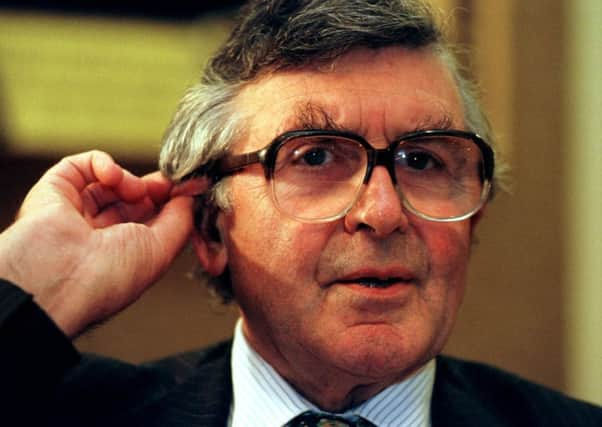Obituary: Lord Jenkin of Roding, Tory cabinet minister famous for political gaffes


Lord Jenkin of Roding, better remembered as Patrick Jenkin, served on the Tory front bench for 20 years, ultimately as a Cabinet minister, but became famous for his gaffes rather than for his considerable achievements.
He certainly made no secret of the sense of injustice he felt on being dropped from the Cabinet by Margaret Thatcher in 1985.
Advertisement
Hide AdAdvertisement
Hide AdHis complaint was that he had been constantly loyal to Thatcher, even though, as she was well aware, he was opposed to many of her policies.
Jenkin was once described as “tailor-made for the role of scapegoat”. He was certainly accident-prone. If there was a banana skin around, his colleagues at Westminster used to wait in horrified fascination for him to tread on it.
He was put in charge of abolishing the Greater London Council, a thankless task, it was widely thought, but Ken Livingstone, its then leader, and other Labour luminaries outside Parliament, seemed to be winning the propaganda and publicity battle throughout this bitter process.
And in the 1970s, during the three-day week, when Jenkin was an energy minister, he urged the nation to clean its teeth in the dark to save electricity.
Then it was discovered that he used an electric toothbrush, and his north London home was photographed during this power crisis with every single light blazing.
Charles Patrick Fleeming Jenkin was born on 7 September, 1926, in Edinburgh. He was educated at Clifton College and served in the army with the Queen’s Own Cameron Highlanders from 1945 to 1948.
On his return, Jenkin graduated with first class honours in law at Jesus College, Cambridge, and practised at the bar for five years, specialising in income tax.
Before entering parliament as MP for Woodford as successor to Sir Winston Churchill in 1964 Jenkin helped to found the Bow Group, then a left-of-centre Tory pressure group. His seat was eventually to become Wanstead and Woodford.
Advertisement
Hide AdAdvertisement
Hide AdWhile the Tories were in opposition until 1970, Jenkin served as a front bench spokesman on Treasury, trade and economic affairs. In the Heath government of 1970 to 1974, Jenkin served as financial secretary, chief secretary to the Treasury and minister of energy.
In opposition again, Jenkin was spokesman on energy and social services. And when the Tories returned to government in 1979, he became secretary of state for social services, followed by industry secretary and then environment secretary until he left the government, reluctantly, in 1985.
He was created a life peer and assumed the title of Lord Jenkin of Roding in 1987.
His removal from the government for alleged political failure was regarded as unfair not only by him but by many of his colleagues. It appears that Margaret Thatcher dropped him because she was dissatisfied with his handling of the abolition of the Greater London Council and the metropolitan authorities.
Many MPs believed he paid an unfairly high price for loyalty to policies laid down by the prime minister in which he did not always believe.
Until shortly before the end of his ministerial career, Jenkin harboured hopes that one day he would become chancellor of the Exchequer. But it was not to be.
Jenkin shared with Margaret Thatcher and Nigel Lawson, the one-time chancellor, the instinct for plunging in and following the course he believed to be correct, however unpopular it might be.
In Thatcher this was seen as courage and honesty, in Lawson as brilliant arrogance, but in the case of Jenkin it was simply seen as sheer political ineptitude, because he lacked the flair to carry it off.
Advertisement
Hide AdAdvertisement
Hide AdHe was not a spectacular politician, and succeeded largely in making the headlines only when something went wrong. He relied not on histrionics but on close and meticulous argument, without the rhetoric.
Jenkin was always a hard-working minister, but had the misfortune to have to promote not only some of the most contentious policies, such as rate capping, but also those with which he was not particularly in agreement.
This was, of course, a huge handicap to him over the GLC abolition, when he was confronted with such a skilful political operator as Ken Livingstone. This is what finally cost him Thatcher’s favour.
At the department of industry he believed that his predecessors had failed in their duty to make British industry competitive with the rest of the world. In that role he struggled to make up lost ground and largely succeeded. Once he said: “I’ve brought the industry department out of the shadows.”
His chief policy was to use grants to encourage the spread of new technology in industry, in everything from robots to micro-electronics.
Once he said: “I am a market man first and foremost. If a firm is not competitive it is not going to survive, nor should it. The role of government is to reinforce the market, to encourage change, not distort it.”
Jenkin always refused to let ministerial red boxes dominate his weekends. He used to rise to work on them at dawn, before putting on his working clothes to get down to some serious brick-laying.
One reason his relations with Thatcher were not always of the warmest was that he was no lover of monetarism. He was the kind of middle-of-the-road Tory who could be heard to mutter about coalition governments in time of crisis, a prospect which would fill Thatcher with horror.
CHRIS MONCRIEFF